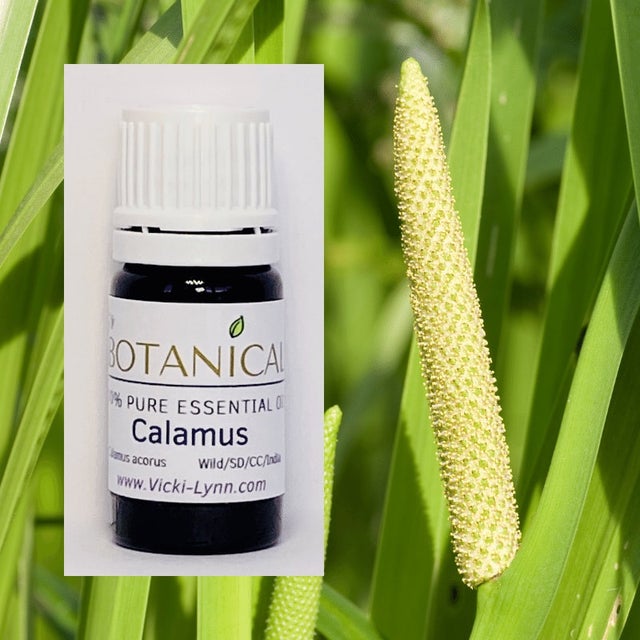- Vicki's Botanicals
- >
- Calamus
Calamus
CALAMUS ESSENTIAL OIL
Size: 5 ml. Violetglass bottle
Botanical Name: Acorus calamus
Source: India
Method: Steam distillation
NOTE: Shipping fee's will be invoiced separately
Calamus essential oil is strengthening to the nervous system, relieving vertigo, headaches, and weakness when inhaled or used topically. As an anti-spasmodic, it can help to reduce the severity of epileptic attacks and convulsive disorders. It relieves panic attacks and dissolves fear when inhaled. Calamus is known for its ability to enhance the memory. It also relaxes compulsive and obsessive thought patterns, as well as helping in the recovery of anorexia and bulimia.
Homeopathic Properties
• Anti-convulsive • Antiseptic • Anti-inflammatory (Gastro: intestinal; Renal: kidneys) • Antispasmodic • Carminative • Cephalic • Diaphoretic • Diuretic • Expectorant • Hypotensive • Insecticide • Nervine • Relaxant (digestive) • Stimulant • Stomachic • Tonic • Tranquilizer • Vermifuge
Uses
Internal–oral homeopathic dosage only (regular dose may be toxic), inhalation
External–topical application, massage, application to points and energy centers
Aromatic Profile
Top Note: Smooth, warm, woody, spicy notes
Heart Note: Warm, woody, spicy with a milky, sweet undertone
Base Note: Sweet, woody
Classification: Heart note
Tenacity: Medium high
In natural perfumery, calamus essential oil is used in oriental perfumes, amber bases, leather notes, and incenses. It blends well with Atlas cedar, bergamot, citruses, clary sage, clove bud, ginger, myrrh, black pepper, and yarrow.
Observations and Anecdotal Information
Calamus essential oil has been used in many cultures around the world. It was once used as a biblical anointing oil in ancient Egypt and Middle East; and has been used extensively by many Native American tribes, including Pawnee, Lakota, Cheyenne, Cree, Penobscot, Mohegan, Osage, Omaha, Potawatomi, Dakota, and Algonquin.
It was historically considered so valuable that it became a primary trade commodity. The dried rhizome was officially listed in the U.S. Pharmacopoeia from 1820 to 1916 and in the National Formulary from 1936 to 1950. Doctors prescribed it for indigestion, stomach ailments, and gas, and as a general tonic. It has been used all over the world as a main ingredient in “Bitters”, to relieve stomach cramps and indigestion.
It is an adrenal stimulant, relieves vertigo and sinus headaches, and is thought to enhance brain function and mind power. For this reason, it can be taken in a homeopathic dilution. Please note that it is important to respect dosage and dilution levels for calamus root, as it can contain asarone (a ketone) in fairly substantial amounts, which may lead to toxicity. For this reason, it should be used externally, or diluted into homeopathic dosages for internal use.
There are two main areas in India that produce this oil; Kashmir and Jammu. The oil from Kashmir is typically under 15% asarone; the oil from Jammu can be up to 90% asarone.
As a massage oil, it is very effective for relieving the pain of gout, rheumatism, and arthritis, and for stimulating lymphatic drainage. It blends very well with ginger, yarrow, lemon, orange, and cedar wood.
Cautions
• May cause convulsions or hallucinations when taken in high doses.
• Not suitable for children or pregnant women.
• Contains asarone, which is a possible carcinogen in high or long term doses.
• Consult with a health care professional for use with liver conditions, or convulsive disorders.
• Internal use with caution. Use at homeopathic doses only, can be toxic at regular doses.
**Shipping fee's will be invoiced separately**
The information on this website is not intended or implied to be a substitute for professional medical advice, diagnosis or treatment. These statements have not been evaluated by the Food and Drug Administration. If you are pregnant, nursing, taking medication, or have a medical condition, please consult your physician and do your research before using these products. All information is provided for educational purposes and should not be viewed as health claims.


